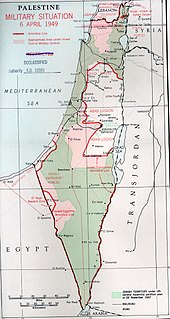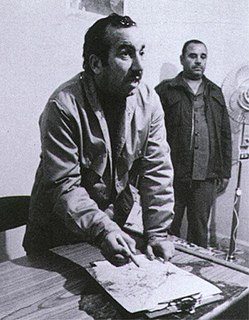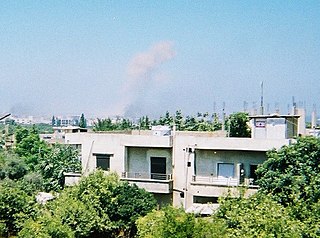
The 1948 Arab–Israeli War, or the First Arab–Israeli War, was fought between the newly declared State of Israel and a military coalition of Arab states over the control of former British Palestine, forming the second and final stage of the 1947–49 Palestine war.

The 1949 Armistice Agreements are a set of armistice agreements signed during 1949 between Israel and neighboring Egypt, Lebanon, Jordan, and Syria to formally end the official hostilities of the 1948 Arab–Israeli War, and establish armistice lines between Israeli forces and Jordanian-Iraqi forces, also known as the Green Line.

Khalil Ibrahim al-Wazir was a Palestinian leader and co-founder of the nationalist party Fatah. As a top aide of Palestine Liberation Organization (PLO) Chairman Yasser Arafat, al-Wazir had considerable influence in Fatah's military activities, eventually becoming the commander of Fatah's armed wing al-Assifa.

Rider, Reaper is the twenty-second book in the series of Deathlands. It was written by Laurence James under the house name James Axler.

The 2007 Lebanon conflict began when fighting broke out between Fatah al-Islam, an Islamist militant organization, and the Lebanese Armed Forces (LAF) on May 20, 2007 in Nahr al-Bared, an UNRWA Palestinian refugee camp near Tripoli.

This is a detailed timeline of the 2007 Lebanon conflict.
El Borak, otherwise known as Francis Xavier Gordon, is a fictional character created by Robert E. Howard. Gordon was a Texan gunfighter from El Paso who had travelled the world and settled in Afghanistan. He is known in Asia for his exploits in that continent.

The Battle of Mirali was a bloody military engagement occurred between 7 October and 10 October 2007 and involved Taliban militants and Pakistani soldiers around the town of Mirali, Pakistan, the second biggest town in the semi-autonomous region on the border with Afghanistan.
Barmal District is a district of Paktika Province, Afghanistan, bordering South Waziristan and North Waziristan, two of the districts of Pakistan's Khyber Pakhtunkhwa province.

"Hawk of the Hills" is an El Borak short story by Robert E. Howard. It was originally published in the June 1935 issue of the pulp magazine Top-Notch, one of only five of the El Borak stories published within Howard's lifetime. The story was featured as the cover of that issue.

Hashemite Kingdom of Jordan/Israel Mixed Armistice Commission was the United Nations organisation of observers which dealt with complaints from Jordan and Israel to maintain the fragile cease fire along the demarcation line between Israel and Jordan. At the closing of the 1948 Arab-Israeli War, on 3 April 1949, the Hashemite Kingdom of Jordan signed a truce with Israel called the 1949 Armistice Agreements. The United Nations Truce Supervision Organisation posted Military Observers as part of the Mixed Armistice Commissions (MACs) to Observe the truce on the Cease fire line and to liaise with the Israeli and Jordanian local area commanders. While the 1948 war was concluded with the 1949 Armistice Agreements it has not marked the end of the Arab–Israeli conflict. The HKJ/IMAC was the organisation which monitored the Jordan/Israel truce agreement, the HJK/IMAC Headquarters was located in Jerusalem close to the Green Line and, through close liaison with the UNTSO headquarters in Government House, Jerusalem, was charged with supervising the truce, investigating border incidents, and taking remedial action to prevent the recurrence of such incidents along the Jordan/Israel Green Line.
Slayer is a 2006 vampire themed television film written and directed by Kevin VanHook and starring Casper Van Dien and Kevin Grevioux. The film's plot involves an elite commando squad dealing with a deadly and bloodthirsty vampire clan living in the South American rain forest. It was produced for the Sci Fi Channel
Crusade is a novel written by Elizabeth Laird and first published by Macmillan in 2007. It is set in the Third Crusade and focuses on a Saracen boy named Salim and an English boy called Adam. It was shortlisted for the 2007 Costa Children's Book Award.

Shadow Kiss is a vampire novel written by Richelle Mead. It is the third novel in the Vampire Academy series, and was preceded by Frostbite. The release of the book pushed the Vampire Academy series into the New York Times Best Seller list for the first time, making its debut at #4. Shadow Kiss continues the story of the main character, Rose Hathaway and her education in becoming a Guardian.
Events in the year 1956 in Israel.
Abd al-Malik Abd al-Wahid was a son of the Marinid sultan of Morocco, Abu al-Hasan Ali ibn Othman. Although he had lost an eye, Malik was a capable military commander and served as governor of Algeciras and the Marinids' principal general in Al Andalus. He captured Gibraltar from Castile in June 1333 and participated in his father's campaign against rebels in the Kingdom of Tlemcen the following year. He was killed by Castilian forces in 1339 after being ambushed on the way back from a raid against the Castilian-held town of Jerez de la Frontera.

The Battle of Tangier or Battle of Jew's Hill took place on 4 May 1664 when a force of Moorish warriors ambushed and defeated a detachment of the garrison of English Tangier led by the Governor Andrew Rutherford, 1st Earl of Teviot, who was killed in the fighting. It was the heaviest defeat suffered by the garrison during the English possession of Tangier (1661–84).

On June 21, 1936, Arab militants attacked a convoy of civilian buses escorted in convoy by British soldiers in Mandatory Palestine along the road from Haifa to Tel Aviv, near Anabta. Two British soldiers were killed, along with 10 or 11 Arabs in what the New York Herald Tribune termed a "major fight" in the 1936–39 Arab revolt in Palestine and the Baltimore Sun described as the "heaviest engagement" of the revolt at that point.
Sheikh Saqr bin Khalid Al Qasimi (1883–1914) was the Ruler of Sharjah from 1883–1914. He took control over Sharjah in a coup during the absence of his uncle, Salim bin Sultan Al Qasimi, and ruled both Sharjah and, from 1900 until his death in 1914, Ras Al Khaimah.
















